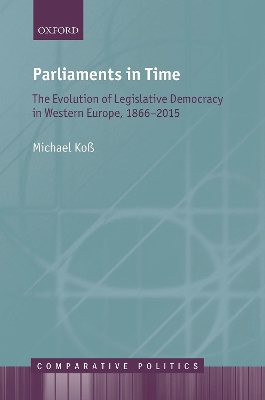Comparative Politics
2 total works
Recently there has been a convergence of party funding regimes across many states of Western Europe. The driving force behind this process has been the introduction of state funding to political parties. This book subsequently asks why state funding to political parties has been introduced in ever more countries and yet there still remain some places where it has only been introduced to a decidedly limited degree? It argues that a consensus of the relevant parties is
a prerequisite for the introduction of state funding, thereby assuming a nexus between particular forms of party competition and the outcome of party funding reforms.
The author shows how the introduction of state funding is more likely to occur in countries where parties have a high number of institutional veto points at their disposal, where both policy- and office-seeking play a more important role in parties' strategic preferences than vote-seeking, and where the discourse on political corruption identifies state funding as a remedy against corrupt practices. These assumptions are confirmed for four cases: Germany, Sweden, the UK, and France. He argues
that two constellations of independent variables facilitate the introduction or reform of state subsidies. On the one hand, in political systems that provide parties with a considerable number of veto points, vote-seeking generally plays a minor role in decisions about party funding. On the other hand
parties can reach a consensus independently of the institutional environment and their strategic preferences by engaging in the discourse on political corruption.
Decreasing levels of ideological polarisation prior to the introduction of state funding imply that causal mechanisms similar to the ones identified in the four case studies are at work in established democracies in Western Europe more generally. Thus, the book represents a first step towards a theory which explains differences and similarities in party funding regimes.
a prerequisite for the introduction of state funding, thereby assuming a nexus between particular forms of party competition and the outcome of party funding reforms.
The author shows how the introduction of state funding is more likely to occur in countries where parties have a high number of institutional veto points at their disposal, where both policy- and office-seeking play a more important role in parties' strategic preferences than vote-seeking, and where the discourse on political corruption identifies state funding as a remedy against corrupt practices. These assumptions are confirmed for four cases: Germany, Sweden, the UK, and France. He argues
that two constellations of independent variables facilitate the introduction or reform of state subsidies. On the one hand, in political systems that provide parties with a considerable number of veto points, vote-seeking generally plays a minor role in decisions about party funding. On the other hand
parties can reach a consensus independently of the institutional environment and their strategic preferences by engaging in the discourse on political corruption.
Decreasing levels of ideological polarisation prior to the introduction of state funding imply that causal mechanisms similar to the ones identified in the four case studies are at work in established democracies in Western Europe more generally. Thus, the book represents a first step towards a theory which explains differences and similarities in party funding regimes.
Comparative Politics is a series for researchers, teachers, and students of political science that deals with contemporary government and politics. Global in scope, books in the series are characterized by a stress on comparative analysis and strong methodological rigour. The series is published in association with the European Consortium for Political Research. For more information visit: www.ecprnet.eu
The series is edited by Emilie van Haute, Professor of Political Science, UniversitA (c) libre de Bruxelles; Ferdinand Muller-Rommel, Director of the Center for the Study of Democracy, Leuphana University; and Susan Scarrow, John and Rebecca Moores Professor of Political Science, University of Houston.
How can we explain the evolution of legislatures in Western Europe? This book analyses ninety procedural reforms which restructured control over the plenary agenda and committee power in Britain, France, Sweden, and Germany between 1866 and 2015. Legislatures evolve towards one of two procedural ideal types: talking (where governments control the agenda) or working legislatures (with powerful committees). All else being equal, legislators' demand for mega-seats on legislative committees
triggers the evolution of working legislatures. If, however, legislators fail to centralize agenda control in response to anti-system obstruction, legislative procedures break down. Rather than a decline of legislatures, talking legislatures accordingly indicate the resilience of legislative democracy. In
conclusion, the book shows the causal nexus between procedural reforms and (legislative) democracy.
The series is edited by Emilie van Haute, Professor of Political Science, UniversitA (c) libre de Bruxelles; Ferdinand Muller-Rommel, Director of the Center for the Study of Democracy, Leuphana University; and Susan Scarrow, John and Rebecca Moores Professor of Political Science, University of Houston.
How can we explain the evolution of legislatures in Western Europe? This book analyses ninety procedural reforms which restructured control over the plenary agenda and committee power in Britain, France, Sweden, and Germany between 1866 and 2015. Legislatures evolve towards one of two procedural ideal types: talking (where governments control the agenda) or working legislatures (with powerful committees). All else being equal, legislators' demand for mega-seats on legislative committees
triggers the evolution of working legislatures. If, however, legislators fail to centralize agenda control in response to anti-system obstruction, legislative procedures break down. Rather than a decline of legislatures, talking legislatures accordingly indicate the resilience of legislative democracy. In
conclusion, the book shows the causal nexus between procedural reforms and (legislative) democracy.

